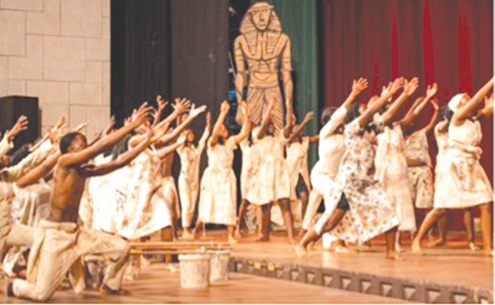
Enduring value of performing arts - Tema International School rocks National Theatre
From the outset to the dramatic finale - where Moses finally summoned the Red Sea to part to let his people go - I sat astounded at the National Theatre, Accra, witnessing a daring artistic rendition of the biblical story, The Prince of Egypt.
Advertisement
I’m a sucker for good theatrical creation and could hardly rein in the flow of emotional juices radiating from the feminine side of my male personality.
It was mind blowing to discern the multi-disciplinary approach to the whole production: the media and design, set and props, music and dance, choreography, costume and make-up, stage design, lights and sound - were all directed by the teenage students.
The play offered a dazzling musical rendezvous enacted through storytelling, acrobatics, juggling, somersaults, choreography, and belly dancing.
As noted by the TIS theatre teacher, Ebenezer Kwame Asime: “working with young, creative minds and nurturing their talents has always been a fulfilling experience.”
It took three good months of navigating and negotiating the production.
African images, voices
In the past, the dramatic interpretations of such biblical stories were produced by Hollywood studios with Eurocentric flavors casting actors like Charlton Heston, Elizabeth Taylor, Richard Burton, etc.
The African origins of the stories themselves were blocked from public specter notwithstanding the historical reality that these were African stories from thousands of years past, but now craftily contextualized for imperial purposes.
Edward Said, the late professor at Columbia University, and iconic activist for Palestinian liberation, alluded in his book, Culture and Imperialism, that the plagiarism of history produced a system of domination as worrying as cannons and soldiers.
In his book, Introduction to African Civilisations, the American Pan-Africanist historian, John G. Jackson, was to note that in the past years, explorers and archeologists have found “the valleys of the Niger, Benwezi, Limpopo and Nile Rivers, in the basin of Lake Chad and the Sahara, extensive remains of hundreds of ruins which bear witness to the existence of former civilisations, hundreds and thousands of years ago.”
Knowledge of the African past revealed stories of triumphs and failures of mankind and form some key chapters in the history of human race, with many of the episodes and characters cast in biblical terms.
As providence would have it, the essence of the TIS production coincided with my previous column, “Time to own our African images, voices”, [November 20, 2023], in which Lucy Quist lamented that “It is regrettable that our entire story is often limited to colonialism and independence.
We seem to be unaware that we had great kingdoms before and great leaders who had organised their societies in remarkable ways”.
She urged all Africans not to let their narrative be stolen or replaced by negative ones.
Prompting that same awareness, the iconic African movie producer and cultural curator, Kwaw Ansah, noted, “All we are trying to do is to bring about African glory; to tell Africans to be themselves and rise to tell their own stories.”
Ansah’s museum at Sekondi, Ghana, “Bisa Aberwa,” was founded with a mission to showcase Africa’s essential contributions to world civilization.
Today, this task for fresh narratives emphasizes a most important growth area for legitimate historical inquiry and appreciation.
Prince of Egypt
For TIS’s 20th-anniversary production, the story of The Prince of Egypt was chosen to underscore the idea that the legacy of hope can endure across generations.
And that even “in the darkest of times, individuals and communities can find the strength to believe in a brighter future and work towards it.”
The musical play demonstrates the enduring power of hope and its ability to inspire and uplift people, instilling a profound sense of optimism and faith in the human spirit, as demonstrated by the TIS founders Alphonse and Comfort Adjavon.
The principal, Dr Ken Darvall, was to note that “In many schools worldwide, the mention of the annual school production usually sends everyone scurrying to find a darker corner in which to hide.
Why? Because school performances are exhausting, stressful, time-consuming and a threat to one’s comfort zone.”
At TIS, he said, the opposite effect happens: “Students come out of the woodwork to try and snag a role within the school production, either onstage or backstage.”
The TIS experience involved everyone — the PYP, MYP, and DP students.
The student directors learned some valuable lessons in leadership, time management, and teamwork across board.
They noted that working with teams of talented individuals demanded adaptability and open-mindedness to others’ opinions.
Over many hours of designing, building, and painting, each crew had the pleasure of seeing their creative ideas come alive on stage.
Service learning projects
A most mature form of education happens through service learning where the youth explore their broad interests while growing their natural talents.
The rewarding aspects are directly related to community projects where one’s humanity and personal abilities are grown and highlighted through a key learning profile in what the International Baccalaureate (IB) curriculum defines as Creativity, Activity, Service (CAS).
In the 21st century, regeneration of society involved “meaningful action and purposeful engagement” between “the individual and the local community”.
The idea is to make a difference, to make the world a better place.
Action and engagement - to give of oneself for the benefit of the larger society - are at the heart of what it means to be human.
TIS has progressively made a name for itself with its yearly capstone projects — in the genre of performing arts — to raise awareness and money to continue the school’s community projects, enriching the lives of underserved and needy children.
The proceeds from this year’s production will be donated for the corrective surgery of babies with “Anorectal Malformation”.
The writer is a trainer of teachers, leadership coach, motivational speaker and quality education advocate.
E-mail: [email protected]




